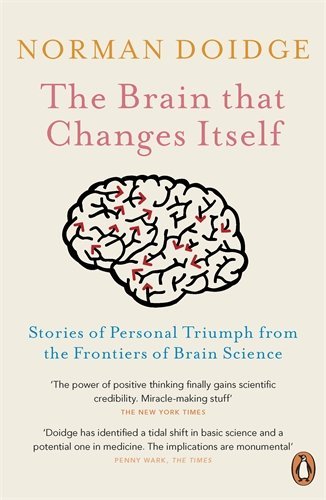 The Brain That Changes Itself, Norman Doidge
The Brain That Changes Itself, Norman Doidge
Content note: discusses some examples you may interpret as animal cruelty.
I have pretty mixed feelings about this book. My main response, I guess, is “read with caution”. There are some parts which are reasonable, well-founded, and which don’t seem to be driven by any bias. Talking about the ways to help people recover from strokes would fall under this category; I was actually a bit surprised that all of the information about brain maps, and the brain’s “use it or lose it” approach to neuronal real estate, was actually considered surprising or controversial. I thought that aspect of neurobiology was fairly clear to people in this day and age. Certainly, the idea that you can expand areas of your brain by using them, and lose abilities by not practicing them, seemed to me obvious. The book was written in 2007, so I expected an understanding of brain plasticity to be the norm, not the underdog.
It’s when Doidge got onto other topics that I started to feel uncomfortable. Googling around a bit showed that Fast ForWord isn’t universally acclaimed, as I’m sure it would be if the results were as unequivocal as Doidge presents them. Just hitting Wikipedia shows some doubt about the experiments — the ones with clear positive results were conducted by biased people and weren’t subjected to double-blind methods.
Then I got to the chapter on “sexual perversions”. Sexual perversion, to Doidge, basically seems to be anything he doesn’t personally like. People with kinks or fetishes are not just different, but sick, in his analysis. And it’s usually their parents’ fault — or porn. It’s not just individual difference, but something which must be corrected. Homogeneity for all.
(I really wonder what he’d think about my total disinterest in a) sex and b) other people’s taboos about sex. If you’re not doing anything to anyone that they don’t want and haven’t asked for, go ahead. Enthusiastic consent obtained? None of my business anymore, if it ever was. Sure, a lot of it makes no sense to me and has no appeal, but nor does skateboarding or bungee jumping.)
He just seems to have a problem with difference in general. If your brain isn’t wired the way other people’s brains are wired, you’ve got to fix it.
This did make his chapter on OCD and related problems interesting to me (see also my mental health awareness post on Generalised Anxiety Disorder and Me). I don’t have any particular arguments with his way of describing OCD and the treatment thereof: I recognise those obsessive behaviours, the things that were unhelpful in trying to reverse them, and the things that actually did help. He criticises CBT in a way that entirely makes sense to me, pointing out that by focusing on the intrusive thought, you can get it more firmly entrenched in your mind. This was a very short chapter, though.
Then there’s a lot of stuff about experiments on animals, which is where I gave up on this guy. I’m not automatically against animal experimentation, when limited, tightly controlled, and cleared or at least discussed with an ethics board. I find it hard, though, to see the value in cutting all the sensory nerves in both a monkey’s arms and then sticking a probe into its brain to measure responses there. I find it especially hard to cope with a narrative where this is so matter of fact that there is no mention of ethical concerns at all — except to complain that they got in the way of science. PETA are often crackpots, I think they might have had a point here, though.
So if you do read this, read it with caution, attention to the notes, reference to outside sources and studies. Be prepared for very dispassionate recountings of some pretty awful experiments. (Sure, let’s sew a kitten’s eye shut for the first weeks of its life, to prove that it can then never process sight with that eye again. It’s not like we could do that experiment just by looking historically at children with cataracts. Oh, wait.) Be prepared for the fact that this guy is in no way neutral.
The sad thing is, I find the idea of brain plasticity utterly fascinating; some of this book is great. Some of it just… isn’t, and I’m sure there must be a better book out there with a bit less of the author’s personal feelings directing the text.
Rating: 2/5

The ideas on Brain Plasicity have become accepted and much more mainstream in the 7 years since 2007. I agree on your issues with any non- double blind, ethically considered research. Biased research is a waste of time and even damaging to science.
Huh, I thought it was longer than that that people have been saying things like “learning a new language in old age keeps more of your brain pathways activated”, etc.